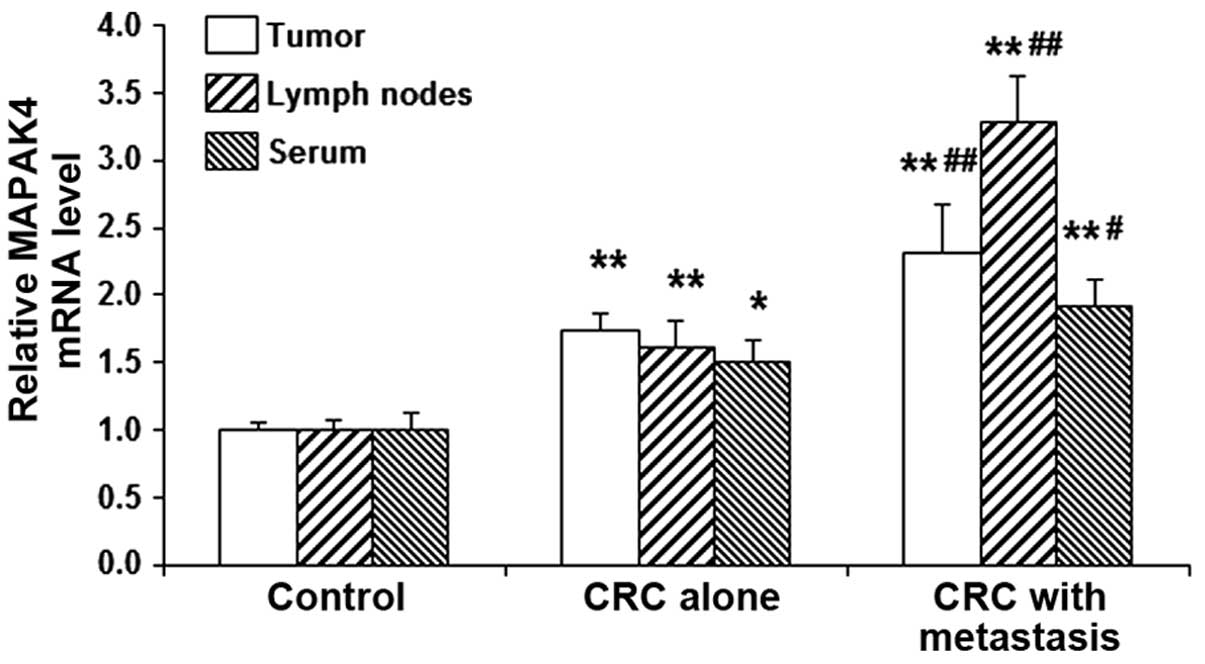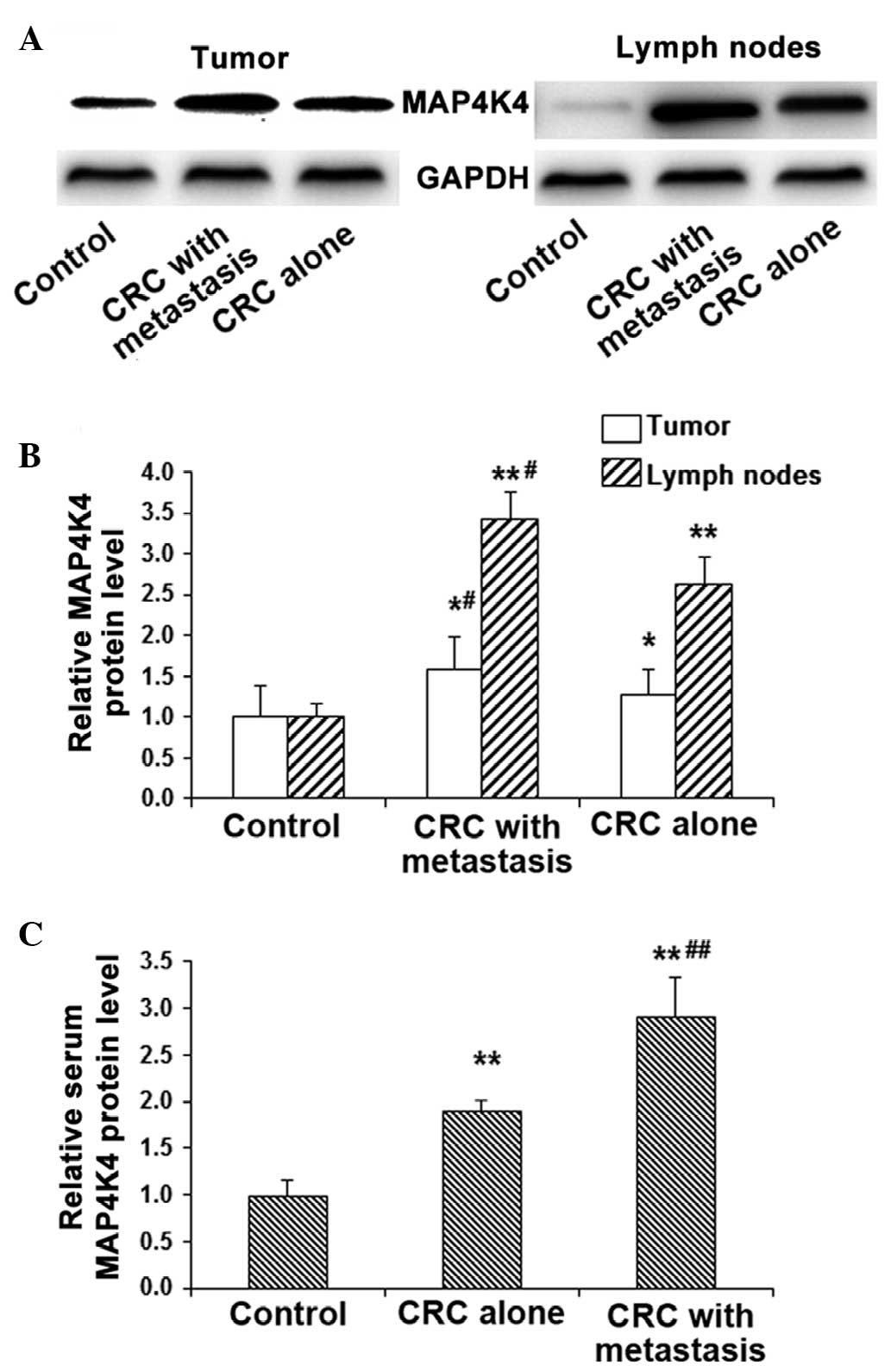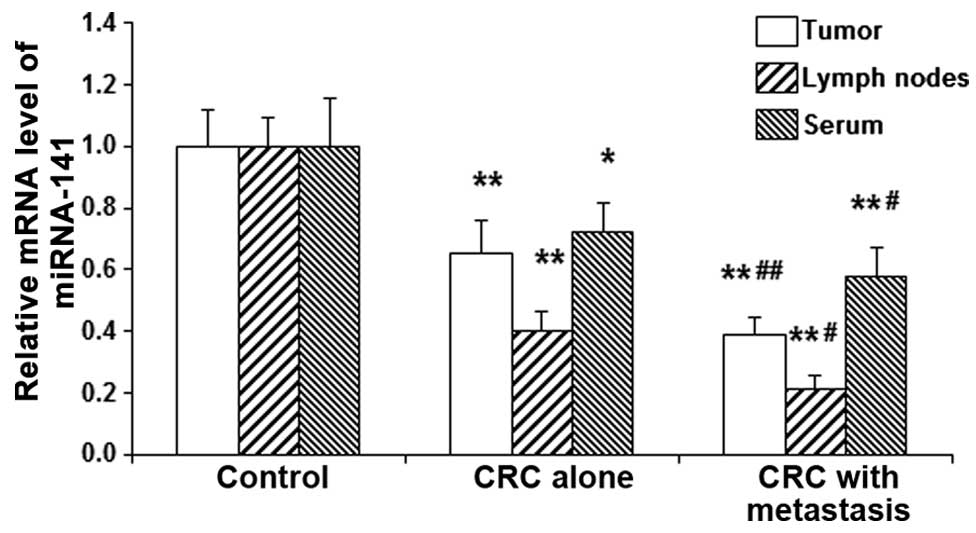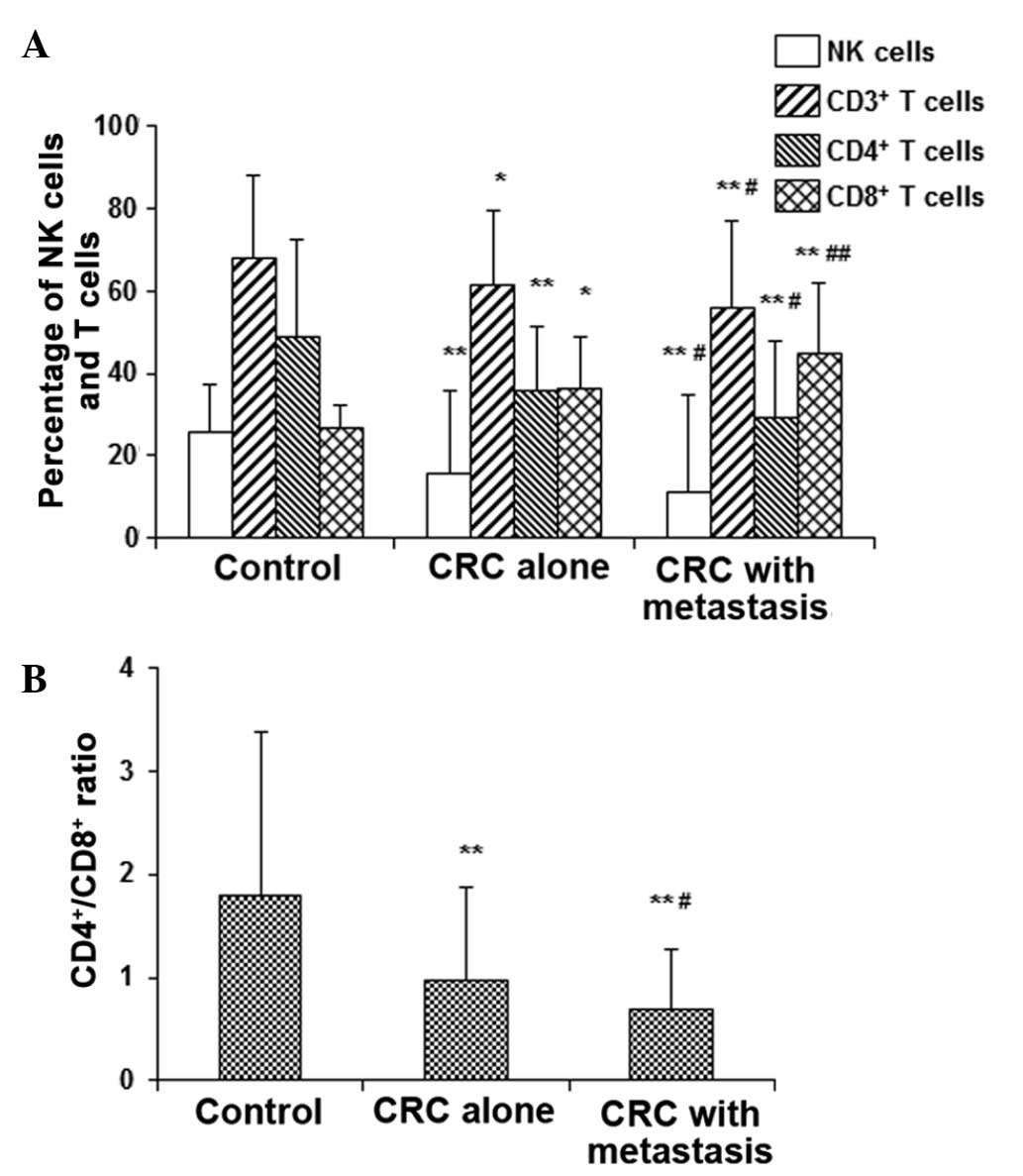|
1
|
Wan DS: Epidemiological trend and control
strategy of colorectal cancer in China. Zhong Hua Zhong Liu Za Zhi.
33:481–483. 2011.(In Chinese).
|
|
2
|
Thosani N, Guha S and Singh H: Colonoscopy
and colorectal cancer incidence and mortality. Gastroenterol Clin
North Am. 42:619–637. 2013. View Article : Google Scholar : PubMed/NCBI
|
|
3
|
Wang Y, Chou WP, Shen CJ, Wang XY and Luo
J: Risk factors of postoperative recurrence after radical resection
of colon cancer. Dalian Yi Ke Da Xue Xue Bao. 35:65–67. 2013.(In
Chinese).
|
|
4
|
Yang S, Liu W, Li M, Wen J, Zhu M and Xu
S: Insulin-like growth factor-1 modulates polycomb Cbx8 expression
and inhibits colon cancer cell apoptosis. Cell Biochem Biophys. Nov
15–2014.(Epub ahead of print).
|
|
5
|
Tsuchida A, Ohno S, Wu W, Borjigin N,
Fujita K, Aoki T, Ueda S, Takanashi M and Kuroda M: miR-92 is a key
oncogenic component of the miR-17-92 cluster in colon cancer.
Cancer Sci. 102:2264–2271. 2011. View Article : Google Scholar : PubMed/NCBI
|
|
6
|
Väyrynen JP, Kantola T, Väyrynen SA,
Klintrup K, Bloigu R, Karhu T, Mäkelä J, Herzig KH, Karttunen TJ,
Tuomisto A and Mäkinen MJ: The relationships between serum cytokine
levels and tumor infiltrating immune cells and their clinical
significance in colorectal cancer. Int J Cancer. 139:112–121. 2016.
View Article : Google Scholar : PubMed/NCBI
|
|
7
|
Kim JM, Cho SJ, Oh YK, Jung HY, Kim YJ and
Kim N: Nuclear factor-kappa B activation pathway in intestinal
epithelial cells is a major regulator of chemokine gene expression
and neutrophil migration induced by Bacteroides fragilis
enterotoxin. Clin Exp Immunol. 130:59–66. 2002. View Article : Google Scholar : PubMed/NCBI
|
|
8
|
Jin SH, Kim TI, Han DS, Shin SK and Kim
WH: Thalidomide suppresses the interleukin 1beta-induced NFkappaB
signaling pathway in colon cancer cells. Ann N Y Acad Sci.
973:414–418. 2002. View Article : Google Scholar : PubMed/NCBI
|
|
9
|
Royuela M, Rodríguez-Berriguete G, Fraile
B and Paniagua R: TNF-alpha/IL-1/NF-kappaB transduction pathway in
human cancer prostate. Histol Histopathol. 23:1279–1290.
2008.PubMed/NCBI
|
|
10
|
Rangaswami H and Kundu GC: Osteopontin
stimulates melanoma growth and lung metastasis through
NIK/MEKK1-dependent MMP-9 activation pathways. Oncol Rep.
18:909–915. 2007.PubMed/NCBI
|
|
11
|
Collins CS, Hong J, Sapinoso L, Zhou Y,
Liu Z, Micklash K, Schultz PG and Hampton GM: A small interfering
RNA screen for modulators of tumor cell motility identifies MAP4K4
as a promigratory kinase. Proc Natl Acad Sci USA. 103:3775–3780.
2006. View Article : Google Scholar : PubMed/NCBI
|
|
12
|
Wright JH, Wang X, Manning G, LaMere BJ,
Le P, Zhu S, Khatry D, Flanagan PM, Buckley SD, Whyte DB, et al:
The STE20 kinase HGK is broadly expressed in human tumor cells and
can modulate cellular transformation, invasion and adhesion. Mol
Cell Biol. 23:2068–2082. 2003. View Article : Google Scholar : PubMed/NCBI
|
|
13
|
Wang B, Shen ZL, Gao ZD, Zhao G, Wang CY,
Yang Y, Zhang JZ, Yan YC, Shen C, Jiang KW, et al: MiR-194,
commonly repressed in colorectal cancer, suppresses tumor growth by
regulating the MAP4K4/c-Jun/MDM2 signaling pathway. Cell cycle.
14:1046–1058. 2015. View Article : Google Scholar : PubMed/NCBI
|
|
14
|
Bureau of Medical Administration, National
Health; Oncology Branch of Chinese Medical Association, .
Standardization of diagnosis and treatment for colorectal cancer in
China (2015 edition). Zhonghua Xiaohua Waike Zazhi. 14:783–799.
2015.(In Chinese).
|
|
15
|
Grimholt RM, Urdal P, Klingenberg O and
Piehler AP: Rapid and reliable detection of α-globin copy number
variations by quantitative real-time PCR. BMC Hematol. 14:42014.
View Article : Google Scholar : PubMed/NCBI
|
|
16
|
Zhao G, Wang B, Liu Y, Zhang JG, Deng SC,
Qin Q, Tian K, Li X, Zhu S, Niu Y, et al: miRNA-141, downregulated
in pancreatic cancer, inhibits cell proliferation and invasion by
directly targeting MAP4K4. Mol Cancer Ther. 12:2569–2580. 2013.
View Article : Google Scholar : PubMed/NCBI
|
|
17
|
Jemal A, Siegel R, Xu J and Ward E: Cancer
statistics, 2010. CA Cancer J Clin. 60:277–300. 2010. View Article : Google Scholar : PubMed/NCBI
|
|
18
|
Jemal A, Bray F, Center MM, Ferlay J, Ward
E and Forman D: Global cancer statistics. CA Cancer J Clin.
61:69–90. 2011. View Article : Google Scholar : PubMed/NCBI
|
|
19
|
Edwards BK, Ward E, Kohler BA, Eheman C,
Zauber AG, Anderson RN, Jemal A, Schymura MJ, Lansdorp-Vogelaar I,
Seeff LC, et al: Annual report to the nation on the status of
cancer, 1975–2006, featuring colorectal cancer trends and impact of
interventions (risk factors, screening and treatment) to reduce
future rates. Cancer. 116:544–573. 2010. View Article : Google Scholar : PubMed/NCBI
|
|
20
|
Franko J, Shi Q, Goldman CD, Pockaj BA,
Nelson GD, Goldberg RM, Pitot HC, Grothey A, Alberts SR and Sargent
DJ: Treatment of colorectal peritoneal carcinomatosis with systemic
chemotherapy: A pooled analysis of north central cancer treatment
group phase III trials N9741 and N9841. J Clin Oncol. 30:263–267.
2012. View Article : Google Scholar : PubMed/NCBI
|
|
21
|
Edge SB and Compton CC: The American joint
committee on cancer: The 7th edition of the AJCC cancer staging
manual and the future of TNM. Ann Surg Oncol. 17:1471–1474. 2010.
View Article : Google Scholar : PubMed/NCBI
|
|
22
|
Akkoca AN, Yanik S, Ozdemir ZT, Cihan FG,
Sayar S, Cincin TG, Cam A and Ozer C: TNM and modified dukes
staging along with the demographic characteristics of patients with
colorectal carcinoma. Int J Clin Exp Med. 7:2828–2835.
2014.PubMed/NCBI
|
|
23
|
Dhillon AS, Hagan S, Rath O and Kolch W:
MAP kinase signalling pathways in cancer. Oncogene. 26:3279–3290.
2007. View Article : Google Scholar : PubMed/NCBI
|
|
24
|
Chen K and Rajewsky N: The evolution of
gene regulation by transcription factors and microRNAs. Nat Rev
Gen. 8:93–103. 2007. View
Article : Google Scholar
|
|
25
|
Lewis BP, Burge CB and Bartel DP:
Conserved seed pairing, often flanked by adenosines, indicates that
thousands of human genes are microRNA targets. Cell. 120:15–20.
2005. View Article : Google Scholar : PubMed/NCBI
|
|
26
|
Zhao X, Mohan R, Özcan S and Tang X:
MicroRNA-30d induces insulin transcription factor MafA and insulin
production by targeting mitogen-activated protein 4 kinase 4
(MAP4K4) in pancreatic β-cells. J Biol Chem. 287:31155–31164. 2012.
View Article : Google Scholar : PubMed/NCBI
|
|
27
|
Iguchi N, Takeda Y, Sato N, Ukichi K,
Katakura A, Ueda K, Narushima T, Higuchi S and Ogasawara K: The
antihistamine olopatadine regulates T cell activation in palladium
allergy. Int Immunopharmacol. 35:70–76. 2016. View Article : Google Scholar : PubMed/NCBI
|
|
28
|
Quan H, Fang L, Pan H, Deng Z, Gao S, Liu
O, Wang Y, Hu Y, Fang X, Yao Z, et al: An adaptive immune response
driven by mature, antigen-experienced T and B cells within the
microenvironment of oral squamous cell carcinoma. Int J Cancer.
138:2952–2962. 2016. View Article : Google Scholar : PubMed/NCBI
|
|
29
|
Jin B: Cell and molecular immunology.
World Book Publishing Company; Beijing: 1995
|
|
30
|
Bi A: Medical immunology. People's
Publishing House; Beijing: 1996
|
|
31
|
Wan LY, Deng J, Xiang XJ, Zhang L, Yu F,
Chen J, Sun Z, Feng M and Xiong JP: miR-320 enhances the
sensitivity of human colon cancer cells to chemoradiotherapy in
vitro by targeting FOXM1. Biochem Biophys Res Commun. 457:125–132.
2015. View Article : Google Scholar : PubMed/NCBI
|
|
32
|
Sun Y, Xing X, Liu Q, Wang Z, Xin Y, Zhang
P, Hu C and Liu Y: Hypoxia-induced autophagy reduces
radiosensitivity by the HIF-1α/miR-210/Bcl-2 pathway in colon
cancer cells. Int J Oncol. 46:750–756. 2015.PubMed/NCBI
|
|
33
|
Tian Y, Pan Q, Shang Y, Zhu R, Ye J, Liu
Y, Zhong X, Li S, He Y, Chen L, et al: MicroRNA-200 (miR-200)
Cluster Regulation by Achaete Scute-like 2 (Ascl2) impact on the
epithelial-mesenchymal transition in colon cancer cells. J Biol
Chem. 289:36101–36115. 2014. View Article : Google Scholar : PubMed/NCBI
|



















